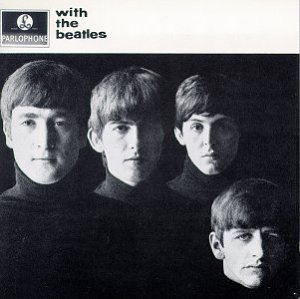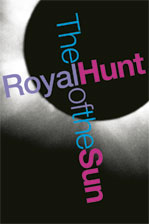
Last night I came home and put on some music. Note that this sentence can mean different things to different people; in my case, it meant something very different last night than it did a week ago. I've been a great fan of the iPod since its inception, to the point that I find myself the curator of a museum of iPods, from the first generation to the latest. This dovetails well with the clutter of my room and my listening habits: when I buy CDs I import them onto my computer, and throw them onto the iPod in uncompressed format. The CDs soon burrow under the cushions of the sofa, and then disappear forerver; computer hard drives and computers come and go with the turnover frequency of relationships (it's been a toss-up the last couple of years); and over the years my music collection is now stored on five iPods (that I really should back up, now that I think about it).
But last night what I did was I turned on my trusty old amp, which was hooked up to the monitor speakers I use for sound editing, and while waiting for the tubes to warm up, sorted through a pile of records and decided to put on Joni Mitchell's Blue. I pulled the record from the dust sleeve, put it on the turntable, and carefully brushed off the dust before clamping it onto the platter. I unclipped the safety latch from the moving coil cartridge and lowered the stylus point onto the edge of the spinning record, and heard a few seconds of what must be one of my favorite sounds in the world (contenders would be that of a cork being pulled from a bottle, or the muffled roar of jet engines roaring into life for take-off). Although the engineering behind it is well-documented, I've never ceased to marvel at how a miniscule stylus being wiggled around can separate into two channels and go on to replicate an illusion of space, one that is populated by a warm, living voice, instruments in the background, or an entire orchestra. I mean, I know how it works, but I don't really understand it, the way you don't understand £60 million: it just ceases to be meaningful as money. (If I ever do come into possession of £60 million one of these days I'll report back and tell you if it becomes any more comprehensible.)
As someone who was in the creative industry just as it was "going digital", I wrestled with the existentialist problems of digital versus analogue in my spare time, but didn't have much time to ponder it in the workplace. This meant that we ended up working with hybrid systems, and at the moment being a purist either way is just either obstinacy or silliness. Film still rules, but not to use non-linear editing would be uniminagable for me now. Between the purist simplicity of my manual turntable and the tube amplifier is a solid-state phono stage to get some gain on the weak signal from the moving coil cartridge. It's a gorgeous frankenstein, I swear.
And the great thing about vinyl is that it's ridiculously cheap. Actually, there's also ridiculously expensive "audiophile" vinyl, and I do admit to owning Sarah McLachlan's Afterglow and Mirrorball on 200g remasters; but audiophiles tend to be nutballs in general. Apparently there are people out there (perhaps with £60 million) who buy these £20,000 speakers or the price of a small apartment for a length of wire. I've complained about the unhelpfulness of computer forums in the past (as opposed to the excellent industry forums for imaging or design), but audio forums seem to be populated by phallus-toting men with more money than sense, who sign off each message with a list of their equipment (yes, really).
I spent a pleasant afternoon in Notting Hill trawling the second-hand record shops, and made a pilgrimage to Harold Moore's classical haven, conveniently opposite Metro Imaging labs. Although I was rushing to catch a show (Noel Coward's Hay Fever, at the Haymarket Theatre Royal, starring Judi Dench doing an impersonation of Norma Desmond), I managed to snatch up some Julie London, a Deutche Grammophon recording of Herbert von Karajan's Dvorak Nine, some EMI recordings of Sir Malcolm Sargent, the Beatles (Parlophone), and Edie Brickell.
 Apart from the last, these were from the days when record labels actually meant something; well, they still do today, to recording artists, but in the industry that has consolidated down to the big four, it makes me treasure my Sinatra on Capitol and Piaf on Pathe that much more. (When I was looking for a pair of monitor speakers a year ago I nearly purchased, in a fit of loony nostalgia, a pair of huge floorstanders each as big as a wardrobe from Decca sound labs.) Listening to great vinyl is a bit of a religious experience, and I don't mean that just in the audiophile's sense that the sound was heavenly (it varies, really); I mean it in the sense that it's evocative of an era before DRM and rootkit installers.
Apart from the last, these were from the days when record labels actually meant something; well, they still do today, to recording artists, but in the industry that has consolidated down to the big four, it makes me treasure my Sinatra on Capitol and Piaf on Pathe that much more. (When I was looking for a pair of monitor speakers a year ago I nearly purchased, in a fit of loony nostalgia, a pair of huge floorstanders each as big as a wardrobe from Decca sound labs.) Listening to great vinyl is a bit of a religious experience, and I don't mean that just in the audiophile's sense that the sound was heavenly (it varies, really); I mean it in the sense that it's evocative of an era before DRM and rootkit installers. As a product of my generation, vinyl will never be the main medium of delivery for my music, though I must admit that I actually haven't bought a CD for ages. Incidentally, of all the vinyl I came home with today, only one of them really makes sense as a purchase, and that's the Beatles: they are, after all, not available for download on the iTunes Music Store.


